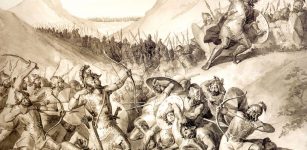Why Couldn’t European Sailors Swim In The Past?
Conny Waters - AncientPages.com - In the Cave of the Swimmers at Wadi Sura in the Gilf Kebir, in the southwest corner of Egypt, not far from Libya and Sudan, there are 8,000-year-old cave paintings depicting humans swimming. These ancient rock art depictions are among the earliest known representations of swimming.
While the Bedouin nomads were familiar with these rock carvings for a long time, the Western world first became aware of their existence in 1933 when desert mapper and explorer Lászlo Almásy discovered them during his explorations. These ancient artworks provide valuable insights into prehistoric societies' cultural practices and artistic expressions.
According to historical records, the earliest humans taught themselves how to swim over 100,000 years ago, driven by the need to acquire food and for recreational purposes. Evidence suggests that Neanderthals living in Italy around 100,000 years ago were proficient swimmers. Their ear bones indicate that they suffered from swimmer's ear, likely due to diving 3-4 meters deep to retrieve clamshells, which they then shaped into tools. This remarkable ability to swim and dive demonstrates the ingenuity and adaptability of our ancient ancestors.
Therefore, it is a bit surprising to learn that well into the 19th century, European sailors' inability to swim was widespread. Those unfortunate individuals who fell overboard faced a grim fate, as they lacked the essential skill to stay afloat. Remarkably, even the renowned English naval officer James Cook, who spent much of his life navigating the world's oceans in the 1700s, could not swim. Cook's lack of swimming proficiency was not isolated; it was a common trait among European sailors until the 1800s. This historical fact highlights the stark contrast between the seafaring lifestyle and the absence of a fundamental survival skill.
The sports culture historian Richard Mandell provides an informative perspective on swimming abilities during the colonial period. According to his research, most Westerners at that time lacked swimming skills. If they acquired any swimming proficiency, it was limited to the basic dog paddle technique, primarily intended for emergencies where they needed to save themselves from drowning.
One significant reason European sailors could not swim was the belief that swimming was unhealthy. Many European doctors in the past advised against swimming, as they believed that water immersion would disrupt the balance of the body's humours, leading to the development of diseases like bubonic plague, cholera, and smallpox, which devastated Europe at the time. This belief stemmed from the prevailing medical theory of the time, which held that the body's health depended on maintaining a proper balance of four humors: blood, phlegm, yellow bile, and black bile. Immersing oneself in water was thought to upset this delicate equilibrium, potentially causing illness.
Illustration from De arte natandi - The art of swimming (1595). Credit: Public Domain
Many medieval Europeans believed that water could spread infections and potentially cause epidemics. British writer George Borrow also noted that swimming was deemed unsuitable for respectable individuals: "To swim one must be naked, and what would a noble person look like without his clothes?" This cultural perception contributed to European sailors' lack of swimming skills during that era.
Swimming was viewed skeptically, particularly in the British Royal Navy and other naval forces. It was believed that teaching sailors how to swim could potentially create cowards. The rationale behind this thinking was that during battles, sailors who knew how to swim might be tempted to jump overboard and abandon the ship rather than remain on board and fight. Consequently, navies preferred their crews to be unable to swim, as this was thought to encourage them to stay and defend the vessel instead of seeking safety in the water.
Some sailors were also afraid of the water and the real and imagined creatures of the seas.
Written by Conny Waters – AncientPages.com Staff Writer
Copyright © AncientPages.com All rights reserved. This material may not be published, broadcast, rewritten or redistributed in whole or part without the express written permission of AncientPages.com
Expand for referencesKaren Eva Carr - Shifting Currents: A World History of Swimming
Nicholas Orme - Early British Swimming 55BC-AD1719
Kevin Dawson - "Swimming, Surfing, and Underwater Diving in the Early Modern Atlantic and the African Diaspora
More From Ancient Pages
-
 Catherine Of Alexandria Courageously Confronted 50 Pagan Philosophers And Was Sentenced To Death
Featured Stories | Oct 15, 2018
Catherine Of Alexandria Courageously Confronted 50 Pagan Philosophers And Was Sentenced To Death
Featured Stories | Oct 15, 2018 -
 On This Day In History: Statue Of Venus de Milo Is Discovered On The Aegean Island Of Milos – On Apr 8, 1820
News | Apr 8, 2016
On This Day In History: Statue Of Venus de Milo Is Discovered On The Aegean Island Of Milos – On Apr 8, 1820
News | Apr 8, 2016 -
 King Tabnit’s Sarcophagus And Its Surprising Forever-Lost Secret
Featured Stories | Jul 30, 2023
King Tabnit’s Sarcophagus And Its Surprising Forever-Lost Secret
Featured Stories | Jul 30, 2023 -
 Aboriginal Legends Tell Millennia-Old Stories Of Events In The Sky
Myths & Legends | Mar 6, 2015
Aboriginal Legends Tell Millennia-Old Stories Of Events In The Sky
Myths & Legends | Mar 6, 2015 -
 Utnapishtim And The Babylonian Flood Story
Featured Stories | Jan 28, 2016
Utnapishtim And The Babylonian Flood Story
Featured Stories | Jan 28, 2016 -
 Delatores – Who Were The Professional Gossip Collectors In Ancient Rome?
Ancient History Facts | Feb 2, 2021
Delatores – Who Were The Professional Gossip Collectors In Ancient Rome?
Ancient History Facts | Feb 2, 2021 -
 Secrets Of The ‘Worlds Of Prav, Nav And Yav’ Revealed – Ancient Slavic Wisdom Confirms The Multiverse Theory
Featured Stories | Oct 6, 2015
Secrets Of The ‘Worlds Of Prav, Nav And Yav’ Revealed – Ancient Slavic Wisdom Confirms The Multiverse Theory
Featured Stories | Oct 6, 2015 -
 13,000-Year-Old Engraving May Depict First Paleolithic Social Group Of Humans
Archaeology | Dec 4, 2015
13,000-Year-Old Engraving May Depict First Paleolithic Social Group Of Humans
Archaeology | Dec 4, 2015 -
 New Cosmic Ray Bombardment Of The Great Pyramid – Search For The Hidden Chamber Continues
Archaeology | Jan 20, 2020
New Cosmic Ray Bombardment Of The Great Pyramid – Search For The Hidden Chamber Continues
Archaeology | Jan 20, 2020 -
 Advanced Technology Of The Ancients: Artificial Platforms Of Mighty Nan Madol
Civilizations | Sep 14, 2018
Advanced Technology Of The Ancients: Artificial Platforms Of Mighty Nan Madol
Civilizations | Sep 14, 2018 -
 Afterlife Of Egyptian Religious Statues Intentionally Hidden In The Temple Of Ptah At Karnak
Archaeology | Sep 22, 2017
Afterlife Of Egyptian Religious Statues Intentionally Hidden In The Temple Of Ptah At Karnak
Archaeology | Sep 22, 2017 -
 Why Were Medieval People Easily Offended And Scared Of Rumors?
Ancient History Facts | Oct 14, 2019
Why Were Medieval People Easily Offended And Scared Of Rumors?
Ancient History Facts | Oct 14, 2019 -
 New Mexico Mammoths Offer Evidence Of Early Humans In North America Much Earlier Than Previously Thought
Archaeology | Aug 1, 2022
New Mexico Mammoths Offer Evidence Of Early Humans In North America Much Earlier Than Previously Thought
Archaeology | Aug 1, 2022 -
 Armenia: Old Land Where Myths, Legends And Long History Meet
Civilizations | Apr 20, 2016
Armenia: Old Land Where Myths, Legends And Long History Meet
Civilizations | Apr 20, 2016 -
 Jason And The Argonauts – Hate, Sorcery, Love And Jealousy Reign In This Famous Greek Story
Featured Stories | Jan 6, 2022
Jason And The Argonauts – Hate, Sorcery, Love And Jealousy Reign In This Famous Greek Story
Featured Stories | Jan 6, 2022 -
 Emperor Kublai Khan: One Of The Most Powerful People In Human History
Featured Stories | May 23, 2017
Emperor Kublai Khan: One Of The Most Powerful People In Human History
Featured Stories | May 23, 2017 -
 Why Winter Solstice Matters Around The World
Archaeoastronomy | Dec 20, 2022
Why Winter Solstice Matters Around The World
Archaeoastronomy | Dec 20, 2022 -
 On This Day In History: Battle of Champion Hill Was Crucial Action Of Grant’s Vicksburg Campaign – On May 16, 1863
News | May 16, 2016
On This Day In History: Battle of Champion Hill Was Crucial Action Of Grant’s Vicksburg Campaign – On May 16, 1863
News | May 16, 2016 -
 Roman Treasures Unearthed At Ancient Site Of Tiel, Netherlands
Archaeology | Apr 2, 2017
Roman Treasures Unearthed At Ancient Site Of Tiel, Netherlands
Archaeology | Apr 2, 2017 -
 Surprising Discovery Of A Perfectly Ancient Road Shows Romans Moved Deeper Into Wales Than Previously Thought
Archaeology | Jul 2, 2022
Surprising Discovery Of A Perfectly Ancient Road Shows Romans Moved Deeper Into Wales Than Previously Thought
Archaeology | Jul 2, 2022


